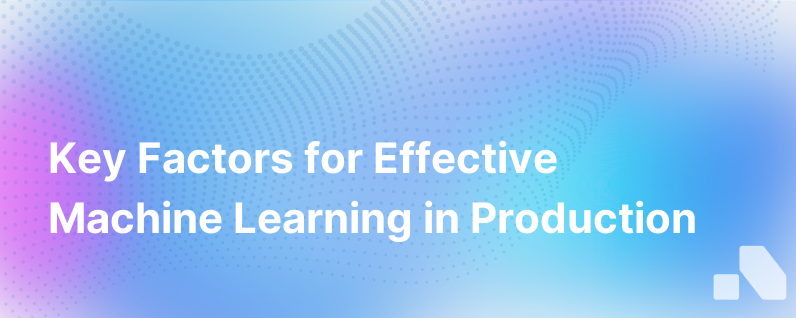What Matters For Machine Learning In Production
Published on October 28, 2023 by Sawyer Middeleer
Machine learning (ML) models have come a long way from the realm of academic research to being robust tools for solving real-world business problems. Deploying a successful machine learning model into production, however, remains a complex task that goes beyond refining algorithms and tuning hyperparameters. For organizations aiming to harness the full potential of ML, understanding what truly matters for machine learning models in production is pivotal.
In this article, we unpack the essentials that every AI-driven organization must prioritize to ensure their ML models not only work effectively in a controlled environment but thrive and provide consistent value in production.
Why Production Environment Is Key
Production is where the theory of machine learning meets reality - it's the ultimate test that determines if a model can transition from yielding impressive results in test simulations to delivering actionable insights within live applications.
Here’s why the production environment is so crucial:
- Data fluidity: Real-world data is messy, incomplete, and often non-stationary. It changes over time, and so must the model adapt to these changes to maintain accuracy and relevance.
- Scalability demands: Models need to handle varying scales of data and requests. Ease of scalability can dictate the success of an ML-driven feature or product.
- Operational integration: An ML model must integrate seamlessly with existing systems and workflows. This is necessary to automate processes and aid decision-making.
- Regulatory compliance and security: In the production environment, models need to comply with data privacy laws and security standards to protect sensitive information.
- User impact: A model in production has a direct impact on user experience and business outcomes. Models must work fast and reliably to meet user expectations.
Key Considerations for ML in Production
To make machine learning models effective in production environments, organizations must navigate multiple layers of challenges and considerations that encompass technical, business, and organizational factors.
-
Data Quality and Management: Data is the lifeblood of any ML system, and ensuring data quality is non-negotiable. In production, data pipelines must be robust, with processes in place for data validation, cleaning, and preprocessing.
-
Model Serving and Scalability: The production environment must support the efficient serving of predictions at scale. This requires careful selection of infrastructure and technologies that enable quick response times and handle the anticipated load without failures.
-
Monitoring and Maintenance: Continuous monitoring of model performance is essential to detect and address any drifts as data evolves. Maintenance routines must include retraining strategies with fresh data, ensuring the model remains accurate and valuable over time.
-
Version Control and Reproducibility: Like software development, ML models in production need rigorous version control mechanisms to manage changes over time. Complete reproducibility of models is essential not only for debugging but also for regulatory compliances where needed.
-
AB Testing and Rollback Strategies: Testing models with real user interactions provides insights that can't be captured in offline environments. Moreover, there should always be a plan to rollback or hot-swap models should the new version degrade in performance when exposed to live data.
-
Automation and CI/CD: Integrating ML models into continuous integration/continuous deployment (CI/CD) pipelines can streamline updates and improve delivery cycles, keeping your models fresh and attuned with less manual overhead.
-
Explainability and Fairness: Models must not only make accurate predictions but also be interpretable, especially when decisions have serious implications. Alongside, fairness concerns must be addressed to prevent any form of data bias from influencing model output.
-
Security and Compliance: Data security and adherence to privacy standards (such as GDPR, CCPA) become even more stringent in production. Encryption, access control, and other security best practices should be implemented to protect sensitive data.
-
Interdisciplinary Collaboration: Deploying ML models effectively in production requires a cohesive effort from cross-functional teams including data scientists, DevOps, ML engineers, and domain experts to ensure that the operationalized models drive value and align with business objectives.
-
Business Alignment: Ultimately, the deployed ML model must align with larger business goals. Whether it's increasing revenue, improving customer experience, or streamlining operations, the value added by the model must be quantifiable against these objectives.
Final Thoughts
In the rapidly evolving field of ML, success in production deployment is a crucial competitive advantage. The voyage from an experimental model to a production-ready solution requires a detailed consideration of the above factors, aligning them with both user expectations and business objectives.
Forward-thinking organizations like Aomni harness powerful AI-driven platforms to tackle these challenges head-on. Aomni offers advanced tools for real-time account research, providing actionable competitive insights and personalized sales content in mere minutes, all effortlessly accessible in a production environment. It stands as an example of ML models operatively woven into the fabric of business processes to catalyze strategic decision-making and amplify sales potential.
Navigating the intricacies of production ML is not trivial, but by focusing on the areas that matter—data quality, scalability, monitoring, collaboration, and business alignment—organizations can build resilient, dynamic, and indispensable ML-powered capabilities that propel them to new heights of operational and strategic excellence.